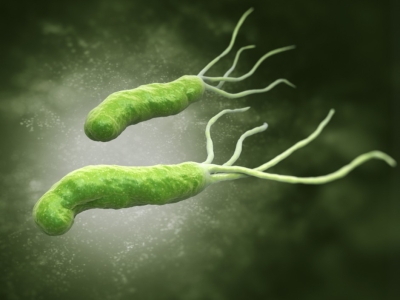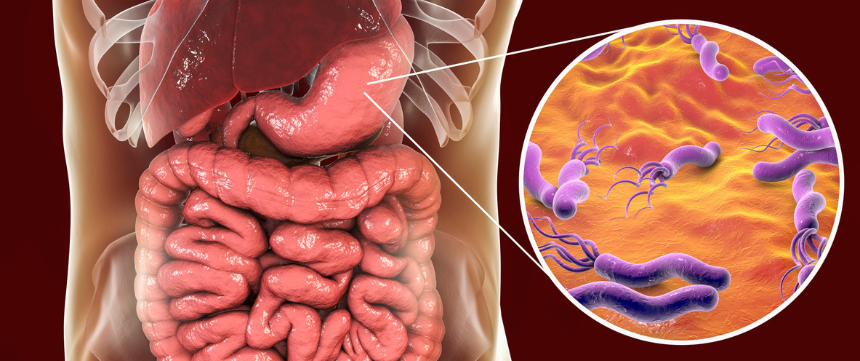
Helicobacter Pylori- Natural Treatment
Helicobacter is increasingly detected in people suffering from Lyme disease. This is due to the very weak immune system of the patient and the ongoing inflammation in his body. However, gastritis, which is the main symptom of H. pylori infection, often shows resistance to conventional treatments - antibiotics and has a strong tendency to relapse. Therefore, this natural treatment of bacteria is becoming more common in the treatment of Helicobacter pylori.
What is Helicobacter pylori?
Helicobacter pylori is a gram-negative bacteria with a spiral shape. Through the production of a large amount of urease, which neutralizes the acidic environment of the stomach creates bacteria ideal conditions for settling in different places of the gastric mucosa and reproduction. In addition, the spiral shape and coils of bacteria allow bacteria to penetrate deep into the gastric mucosa, where inflammation and ulceration occur. Therefore, Helicobacter pyrolium is mainly responsible for gastritis, stomach ulcers and duodenal ulcers.
Symptoms of Helicobacter pylori:
It is estimated that up to 80% of those infected do not show any symptoms of the disease. Only the remaining part experiences symptoms characteristic of stomach disorders, and this is primarily:
- heartburn
- bouncing
- nausea
- abdominal pain
- flatulence
- White raid on the tongue
- bad breath.
However, it must be remembered that Helicobacter can also cause less specific symptoms, which are often not associated with this disease. It can be: deficiency of iron or vitamin B12, acne, migraines, food intolerance or chronic fatigue.

Treatment
Treatment of Helicobacter pyrolysis is mainly based on antibiotic therapy (often with Pylera). Natural methods can be an ideal complement to the therapy or used as a separate method of treatment.
1. Probiotics
A very important element of treatment is proper probiotic therapy. It increases the effectiveness of the antibiotic used (studies say up to 13%) and, above all, reduces the side effects of infection. Noteworthy strains include:
- Saccharomyces boulardii, commonly available in the preparation Enterol. Especially recommended with concomitant antibiotic therapy, as it improves its tolerance.
- Lactobacillus reuteri DSM 17648, commonly available in HELICOgastrin. This probiotic interferes with the motility of H. pylori, reduces its invasiveness and facilitates the removal of bacteria from the stomach.
- Lactobacillus plantarum LA 301, lactobacillus salivarius LA 302, commonly available in Lactibiane H-Py. The preparation promotes the maintenance of mucosal function in the stomach and small intestine.
2. Herbs
Many natural herbs have antimicrobial activity and are able to inhibit the growth of Helicobacter pylori. Among other things:
- Licorice, a plant with more than 100 active substances, some of which have bactericidal activity against H. pylori. Licorice supplementation can accelerate the regeneration of the gastric mucosa and reduce symptoms such as indigestion, heartburn or bloating.
- Curcumin, the main bioactive substance in turmeric, which has strong antioxidant, antimicrobial and anti-inflammatory properties. Studies show that curcumin supplementation (at a dose of 3×500 mg) resulted in healing of gastric and duodenal ulcers in 48% of patients after 4 weeks and in 76% of patients after 12 weeks of supplementation.
- Berberine, the main bioactive substance in Barberry. It is great for treating various diseases within the digestive system and facilitates the removal of Helicobacter bacteria from the stomach.
- Lactoferrin is a very important component of breast milk. Studies show that bovine lactoferrin (at a dose of 2×200 mg) inhibits the colonization of H. pylori in the stomach and improves the results of a respiratory test with urea.
Propolis is a sticky and dense substance used by bees to lining the inside of a hive. A 2012 study shows that propolis therapy resulted in a complete cure in 63.6% of patients with gastric and duodenal ulcers, and the remaining 36.4% saw a decrease in H. pylori infection from high to medium and low levels.
- Sulforaphane, found in broccoli seed extract. This substance can reduce inflammation and gastritis, as well as improve the condition of the gastric mucosa.
3. Diet
Diet alone is not able to eliminate Helicobacter Pylori bacteria, but it is a very important element supporting treatment. Throughout the course of treatment and for several weeks after its completion, it is worth introducing a specialized diet that will reduce inflammation and regenerate the gastric mucosa. Here are some of the most important rules:
- The diet should be light. You should avoid heavy, hard to digest food. It is recommended to mainly cook on water, steaming or stewing.
- Meals should not have extreme temperatures, so they should not be too cold or too hot.
Eat regularly and don't overeat.
- Avoid carbonated drinks, caffeine, and spicy or pickled foods in your diet.
- Avoid raw products. Enter into the diet vegetables and fruits in boiled form (mainly carrots, pumpkin, zucchini, beets, spinach, sweet potatoes, potatoes)
- Monitor the supply of fluids
- Eat good quality fats, including omega 3 fatty acids
- Avoid puffy foods.
In conclusion, Helicobacter pylori is a very dangerous pathogenic factor. It can lead to a number of complications, including stomach cancer and death. That is why it is so important to take care of proper hygiene and implement treatment as soon as possible.

 Boosting Your Libido Naturally with Herbal Supplements
Boosting Your Libido Naturally with Herbal Supplements
 Unlocking Energy Potential: Shilajit's Impact on ATP Production and Vitalit
Unlocking Energy Potential: Shilajit's Impact on ATP Production and Vitalit
 Collagen's Role in Lyme Disease Recovery: Understanding Its Vital Benefits
Collagen's Role in Lyme Disease Recovery: Understanding Its Vital Benefits
 Helicobacter Pylori- Natural Treatment
Helicobacter Pylori- Natural Treatment
 Sleep and Immunity
Sleep and Immunity